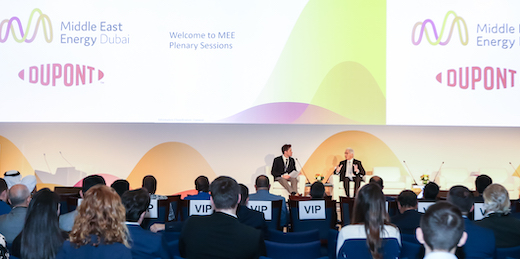The below comments were published in Gulf Today, in an article titled “Global energy platform spotlights latest breakthroughs, challenges“, on the basis of the discussion at the Middle East Energy 2020 conference, held in Dubai on 3rd March 2020. Dr. Nasser Saidi’s comments are posted below.
Nasser Saidi, Chairman, Clean Energy Business Council Mena, said, “Currently, there are seven gigawatts of renewable energy projects in the region and this is very encouraging for the transformation of the energy mix in GCC countries. If you look at prices, we are currently at $0.14 per kilowatt for renewable energy and heading towards $0.01. This means the region is not only at the forefront in adopting renewable sources such as solar power, it means fossil fuel power generation is now being outcompeted by renewables.”
He added, “If you’re going to invest in the regional energy sector, it has to be in renewables. They are much more efficient, cleaner for the environment and can be achieved at much less cost.”
Saidi also added that ending regional energy subsidies, which have historically kept energy prices lower, will benefit both public and private sectors, consumers and the planet, with money previously set aside for subsides instead being utilised in renewables-based research and development, job creation and a greater understanding of how much energy is being consumed versus how much is actually needed.
The clean energy advocate also stressed the region is primed to take the lead in energy grid integration, stressing his desire for “everyone across the GCC to have their own power plant” is unnecessary.
“Let’s integrate the grids across the UAE, across the GCC. Integrated cooperation across the GCC will make for greater efficiency. It means that if there is a surge in energy demand in one location, it can be satisfied by other countries on the grid.” Saidi told Middle East Energy delegates that while clean energy targets are a start, they mostly form part of a wider framework centred around climate policy and decarbonising economies for the future, insisting Mena governments and energy companies are already in the driving seat to chart a decarbonised future.
“There is an enormous opportunity for the region to invest in the industry and create jobs. We’ve long been energy consumers; now we should become exporters of renewable energy. There’s no reason why we cannot be at the forefront, as producers of solar technology, to link Europe and North Africa,” added Saidi.
“If there’s one place where we should be doing research and development in solar it is here, not in Europe. We have approximately 355 days of sunshine. Let’s take the lead, build homegrown technology and become exporters of that technology. We can partner with countries such as China who are at the forefront of solar technology. I think this is the answer.”
Comments from the Middle East Energy 2020 conference in Gulf Today, 3 Mar 2020
4 March, 2020
read 2 minutes
Read Next
TV and radio
Bloomberg’s Horizons Middle East & Africa Interview, 17 Jul 2024
Aathira Prasad joined Joumanna Bercetche on 22nd July, 2024 as part of the Horizons Middle
18 July, 2024
media page
“A GCC spaceport could bring galactic gains”, Op-ed in Arabian Gulf Business Insight (AGBI), 4 Jul 2024
The opinion piece titled “A GCC spaceport could bring galactic gains” was published in the
5 July, 2024
media page
“Central Bank Digital Currencies: Will they replace the cash in our wallets?”, Op-ed in The National, 30 Jun 2024
The article titled “Central Bank Digital Currencies: Will they replace the cash in our wallets?”
30 June, 2024






